#i think herman melville would like this
Text
fuck it, queequeg fancam (feat. ishmael)
#it's fine it's what he deserves#i think herman melville would like this#queequeg#moby dick#queeshmael#ishmael moby dick#i can do whatever i want
212 notes
·
View notes
Text
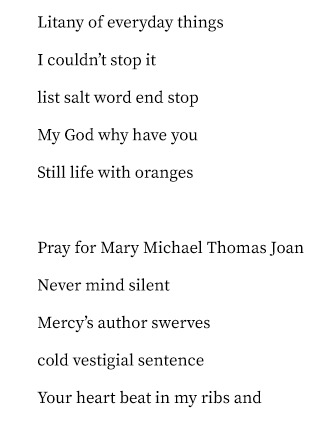
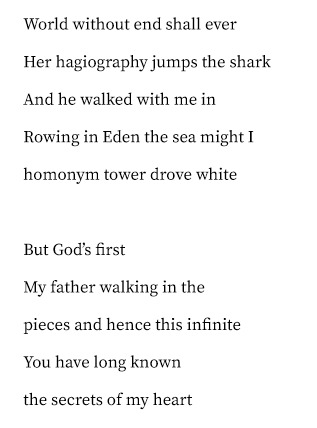
from litanies
#poetry#poets on tumblr#spilled ink#herman melville#thomas more#image description in alt#wrote these for a susan howe class and actually ended up liking them lol#trying to post more of my original work on here and thought these would be fun#lots of intertext going on in here i dont want people thinking i actually came up w stuff like you have long known the secrets of my heart#i like to think im a good writer but im not robert bolt good#or melville for that matter#my favorite original line in this is 'her hagiography jumps the shark' idk i just thought it was funny#literature#love#***
1 note
·
View note
Text
Melville himself apparently thought of Moby-Dick as a man's book and wrote to one of his female friends, Sara Moorehead, to dissuade her from reading it for fear of offending her feminine sensibilities: "Dont you buy it—dont even read it, when it does come out, because it is by no means the sort of book for you. It is not a piece of fine, feminine, Spitalfield silk—but is of the horrible texture of a fabric that should be woven of ship's cables and hausers.[2]" When Sophia Hawthorne wrote to Melville praising the book, his response was one of astonishment: "I have hunted up the finest Bath I could find, gilt-edged and stamped, whereon to inscribe my humble acknowledgment of your highly flattering letter of the 29th of Dec:—It really amazed me that you should find any satisfaction in that book. It is true that some men have said they were pleased with it but you are the only woman—for as a general thing, women have small taste for the sea.[3]" "Next time," Melville tells Sophia, he shall not send her a "bowl of salt water. . . . The next chalice I shall commend, will be a rural bowl of milk." He then inquires politely about the state of her "domestic affairs."[4] Melville's remarks to these women suggest that he was working under certain gender-determined notions of genre.
Content warning: This book contains the horrible texture of a fabric that should be woven of ship's cables and hausers.
I don't think it's just something period-typical because it implies it now isn't, gender-determined notions of genre are still a thing around the world.
I do feel that in Moorehead's place, I'd have gone WELL NOW I'M GONNA. It's funny to me that in general the boys in my American Literature class would comment things like how it's mostly boring (you don't get it) or about how this is about the national identity of a young country, meanwhile girls would pipe in about multiple facets.
Amerilit girlies: I have so much to say about Moby Dick!
Herman: absolutely flabbergasted
#Melville and the Woman's Story#I haven't read the rest of the paper yet#moby dick#herman melville#whale weekly#van helsing moment#the whale weekly
851 notes
·
View notes
Text


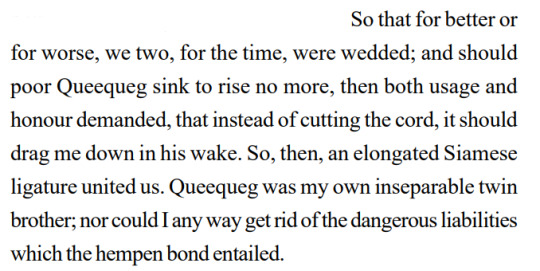





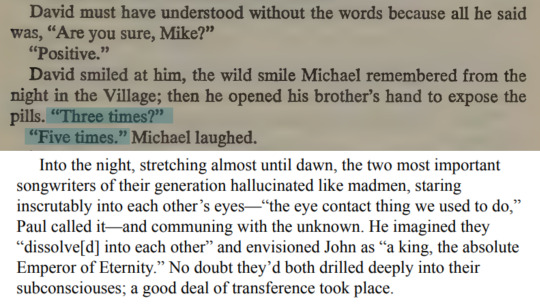

"You see, John and I grew up like twins although he was a year and a half older than me. We grew up literally in the same bed because when we were on holiday, hitchhiking or whatever, we would share a bed. Or when we were writing songs as kids he'd be in my bedroom or I'd be in his. Or he'd be in my front parlour or I'd be in his, although his Aunt Mimi sometimes kicked us out into the vestibule!"
"I think Linda put her finger on it when she said me and John were like mirror images of each other. Even down to how we started writing together, facing each other, eyeball to eyeball, exactly like looking in the mirror."
twins, bari wood; moby dick, herman melville; the beatles: the biography, bob spitz; dead ringers, cronenberg
#someone needs to volunteer to euthanize me atp.#when the mclennon pseudo-incestual vibes hit#they wouldve loved being conjoined twins fr#beatles
163 notes
·
View notes
Note
I've seen you answer a few asks about whaling history before, so hopefully I'm not offbase asking you questions out of the blue? But anyway, how did people bathe (or keep clean if not by bathing) during long sea voyages?
Not off base at all! Out of the blue whaling history questions are some of my fav asks to receive; I find them thrilling. I can’t help but write an essay every time.
It was particularly hard to keep clean on a whaler, and whalemen were often disparaged by those in other maritime professions. In 1839, naval Lieutenant Charles Wilkes said of the crew of the whaleship America,
“I have seldom seen at sea a more uncombed and dirty set of mariners than his crew.“
J.E. Haviland of the Baltic, 1856, complained of besmirching his journal pages with the grime that he was unable to scrub off his hands after tarring the rigging, self consciously saying:
“My hands + clothes would look beautiful for a ladies Parlor. I see they even collor the paper but I cannot get the tar out. The Old Man says he intends to have me tar down the rigging a few days before we get in New Bedford so that I shall not forget too soon that I have been a sailor.”
General ships’ work such as tarring could be messy, but a whaler’s work was even messier. When trying out blubber it was futile to attempt maintaining any semblance of cleanliness during the process. William Abbe of the Atkins Adams, 1859, said that during boiling, a watch would turn in to their bunks a few hours rest, merely ‘after wiping off your bare body with oakum to take off the thickest of the oil”.
But the gore and oil wasn’t forever. After the particular job was done the ship would be meticulously cleaned, and the whalers would tend to themselves too. As Herman Melville wrote,
“The crew themselves proceed to their own ablutions; shift themselves from top to toe; and finally issue to the immaculate deck, fresh and all aglow, as bridegrooms new-leaped from out the daintiest Holland. Now, with elated step, they pace the planks in twos and threes, and humorously discourse of parlors, sofas, carpets, and fine cambrics; propose to mat the deck; think of having hanging to the top; object not to taking tea by moonlight on the piazza of the forecastle. To hint to such musked mariners of oil, and bone, and blubber, were little short of audacity. They know not the thing you distantly allude to. Away, and bring us napkins!”
Haviland expressed gratitude in getting a chance to get clean after all the work of boiling blubber was done:
“I feel much better to day I have given myself a good wash + a clean shave + got in all clean clothes. You would not have known your own son if you could have seen him yesterday. I was nearly black with smoke + dirt. (with shame) I say it was the accumulation of 2 months dirt + 4 months beard. Everything looks as clean + bright as it did before we took the whale”
Being able to bathe was such a highlight that Abbe titled one of his journal pages “Washing myself!!” With TWO exclamation points!
“I write with pride in my fastidious journal that this morning I washed my face + hands with castile soap + fresh water — when shall I do the like again? When shall I write the pleasant and comfortable fact that I have shaved? The future and fair weather only can tell.”
The ship’s slop chest—its general store—had toiletries for sale, often at a very high premium. Whaling account books show men buying pounds of oil soap for their own personal stores. The fresh water was often rainwater collected for this purpose, rather than the casks set aside for drinking.
“This has been a rather squally day,” wrote Mary Lawrence, whaling wife who accompanied her husband on his ship Addison in the 1850s. “Considerable rain has fallen, and everybody on deck is using an abundant supply of rainwater for washing purposes.” She also added, though this is speaking of laundry rather than bathing, “Having stopped up the scuppers, the use the whole deck for one grand washtub.”
They’d use the sea, too. John Martin of the Lucy Ann, wrote of bathing via rain and sea whilst near the equator on January 24th, 1842.
“Towards noon the rain came down in torrents. The weather being sultry the watch on deck shipped off their shirts to it. John the boat steerer went entirely naked with the exception of a handkerchief tied around his privates. In the afternoon it cleared away, when I asked permission from the Captain for the crew to take a bathe over the side. He said we might do it if we rigged a studding sail over the side, which was soon done & all hands that could swim were to be seen jumping from different parts of the ship. Some went out to the end of the flying jib boom & jumped off there. Even the dog was thrown overboard & got his share of washing. I like bathing at sea but for one thing, and that is sharks. I always have a fear that one might be hovering about and give one a nip before he was aware of it.”
It was challenging for whalers to keep clean by nature of the job, but man when they were able to they really seemed to revel in it. For many of them it was more than just a bath; it was a symbolic return to a home they were long away from, or to the man they perceived themselves to be back on shore, or of a society that they felt cut off from in their line of work.
If you’re interested I also wrote a thing about doing laundry on whaleships too, yonder!
149 notes
·
View notes
Photo

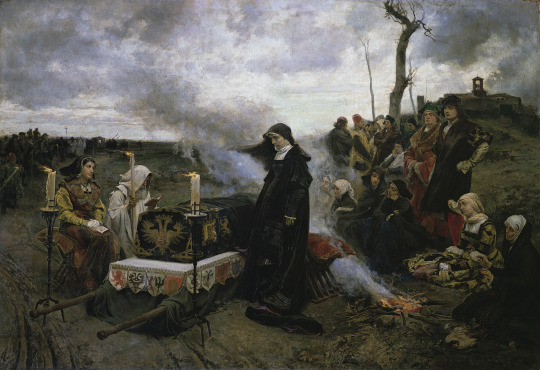

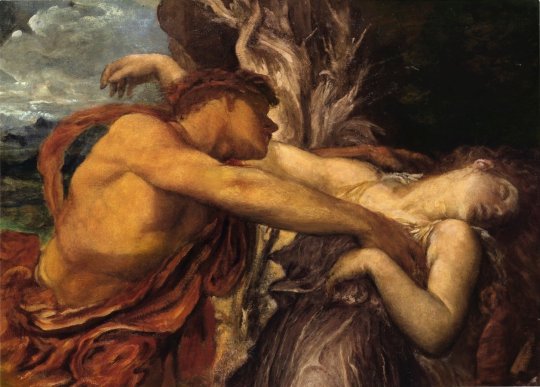

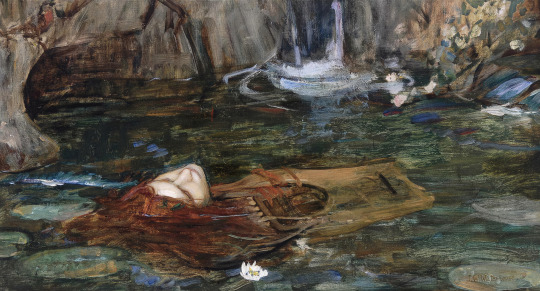
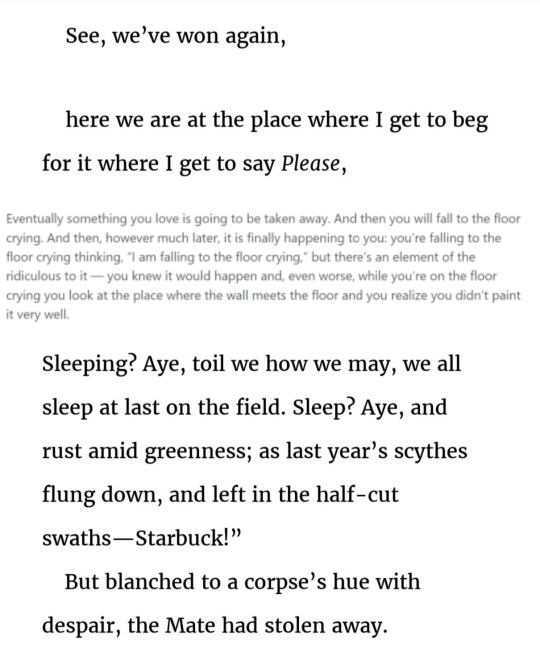
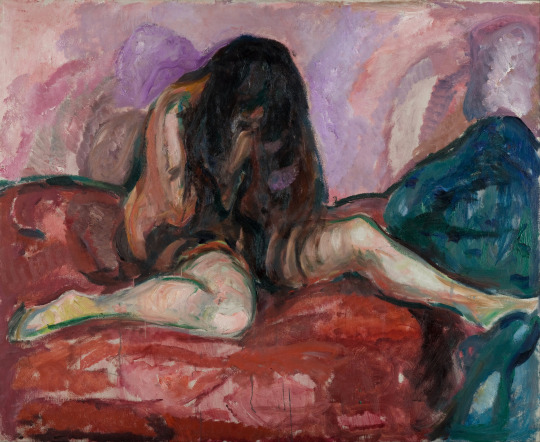
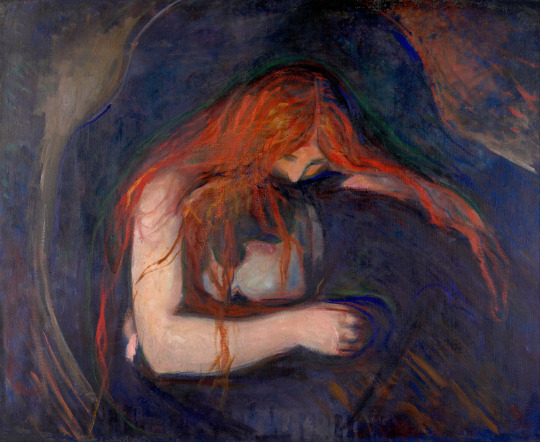

only one of you is going to make it and you’re afraid it's going to be you, or, alternatively: you are standing by the tragic hero and it is looking rough out there-
( @lasilhouetteinbianco i did it there’s moby. whoo)
A History of My Brief Body, Billy-Ray Belcourt | Antigonick, Sophokles trans. Anne Carson | The Little Prince, Antoine de Saint-Exupéry | Doña Juana “la Loca” (1877), Francisco Pradilla | Giovanni’s Room, James Baldwin | THE TRAGIC HERO UPON REACHING THE END OF THE SCRIPT REALIZES HE HAS BEEN DEAD THIS WHOLE TIME, Joan Tierney | Wishbone, Richard Siken | Orpheus and Eurydice, George Frederic Watts | Bitter Water, The Oh Hellos | Sonnet 116, William Shakespeare | YOUR LOVE FINDS ITS WAY BACK, Sierra Mulder | Nymphs Finding the Head of Orpheus (detail, 1905), John William Waterhouse | Wishbone, Richard Siken | Richard Siken, in an interview with James Hall | Moby Dick, Herman Melville | Weeping Nude (1913-14), Edvard Munch | Love and Pain (1895), Edvard Munch | Metamorphoses, Ovid
[ID: An assortment of various quotes, lyrics, and paintings from a variety of sources.
1. To love someone / is firstly to confess: I’m prepared / to be devastated by you.
2. Ismene: I can help you suffer. // Antigone: No. // Ismene: I can give you reasons not to die. // Antigone: No.
3. And he took me by the hand. But he was still worrying. “It was wrong of you to come. You will suffer. I shall look like I was dead, and that will not be true...” I said nothing.
4. A painting of a young woman dressed in black. She stands in blank despair beside a casket in an open field. She is surrounded by a procession of numerous mourners, as smoke from a behind her rises into the air.
5. What are we staying here for? How long do you / want to sit in this house, eating your heart out?
6. You are kneeling at the water’s throne / When preparing for an ending scene / It’s important that / Swords drop like anchors / Yours will never rise again / I am watching from the cowberries, or / From your mother’s curtains, as if / Through a burial shroud, or
7. And it’s another wrong-man-dies scenario / and we keep doing it, Henry, / keep saying until we get it right... but we / always win and we never quit.
8. A painting of Orpheus and Eurydice at the entrance to Hades. Orpheus, in a toga, reaches out to catch Eurydice as she goes limp and pale, soul having returned to the Underworld. In the background a dead tree trunk can be seen.
9. I am not a fool entire / No, I know what is coming / You will bury me beneath the tree / I climbed when I was a child
10. Love alters not with his brief hours and weeks, / But bears it out even to the edge of doom.
11. My throat is a beehive pitched into the river. Look! / Look how long my love can hold it’s breath.
12. A painting of Orpheus’ head floating down a river after being torn apart by the Maenads. His face is turned upward, with pale skin and long red hair. His lyre floats beside him, alongside numerous lily pads and lilies.
13. See, we’ve won again / here we are at the place where I get to beg / for it where I get to say, Please,
14. Eventually something you love is going to be taken away. And then you will fall to the floor crying. And then, however much later, it is finally happening to you: you’re falling to the floor crying thinking, “I am falling to the floor crying,” but there’s an element of the ridiculous to it — you knew it would happen and, even worse, while you’re on the floor crying you look at the place where the wall meets the floor and you realize you didn’t paint it very well.
15. “...Sleeping? Aye, toil how we may, we all sleep on the field. Sleep? Aye, and rust amidst greenness; as last years scythes flung down, and left in the half-cut swathes — Starbuck!” But blanched to a corpse’s hue with despair, the Mate had stolen away.
16. A painting of a nude woman sitting upon her bed, hunched over with her head in her hands and legs sprawled. She appears to be weeping. Her long, dark hair, spills around her shoulders and into her lap.
17. A painting of a woman and a man embracing each other. The woman has warm skin and long red hair, which spills over and contrasts with the man’s pale, grey skin. She buries her face into his nape, and he into her arms.
18. But when she saw him in his hapless plight, / though angry at his scorn, she only grieved. End ID.]
#webweaving#web weaving#oh god this one was a MONSTER#christ.#woe be upon ye#you know the drill#retribution#thornwhirr#dustmill#hiuhcore#wubweaving
710 notes
·
View notes
Text
canto V speculation/spoilers, featuring discussion of moby dick and lots of guessing.
a note that with my predictions, i am just spitballing here.
still fascinated with the fact that queequeg is a former member of the middle. i would assume she was one of the more skilled members as well, even if only just to play off her original counterpart's position as nobility in his tribe. lest we forget his strong proficiency in harpooning. i wonder if we will have ishmael reference queequeg in being instrumental to her skills with a harpoon?
given ishmael mentioning in the blubbering toad's logs having someone long ago comfort her while crying over something, i have to wonder if this was queequeg, and if queequeg ended up being a mentor to her. the way the members of the middle are referred to as either "big brother" or "big sister" makes me think of a shield/protector sort of role being advertised by them, even if it ends up being a farce. perhaps queequeg had some disillusionment with the operations of the middle? a contrast between the middle's (probable) brutality and queequeg's (if we go by the source) kind-hearted nature?
i think often on source queequeg's sentiment that his exposure to the white christian world have become a taint in his soul, and that he feels unworthy of returning to his home. the world of the city being, for better and definitely for worse "aracial" makes much of the relevance and themes of moby dick a little tricky to translate, imo. for those who might not have read moby dick, my favorite thing to say about it is: "the whale is white for a reason."
schools in the united states often teach that the lesson about race to take away from moby dick are simply not to judge another person by the color of their skin, but that is a vast oversimplification. moby dick was released pre-civil war and asserted that the very concept of whiteness is an inherent evil. it condemned slavery, argued against the merits of the very-popular-at-the-time "scientific" school of phrenology. most importantly, it suggests that the glorification of whiteness as a designation of purity and the reason to guide the "lesser non-white races" is the source of all of christianity's evils. with this in mind, i'd like to bring up that sometimes people nowadays make a show of "wow, moby dick was a commercial failure, but now it's considered one of the greatest american books ever written. thank goodness we discovered it." what actually happened is that moby dick was critically panned in virtually all liberal (in the classical/socialist sense) media circles, but celebrated in socialist ones. you can probably guess why.
perhaps that gives context to my skepticism of how queequeg will be handled in a thematic sense. some people point to queequeg in moby dick as a progenitor of the harmful "noble savage" trope, and i don't think that's entirely without basis. but the difference between moby dick and many other media with "noble savages" is that queequeg was created as a philosophical counter to the very notion of white (and christian) supremacy, whereas the majority examples use this to show the virtues of white society. there is also the fact that queequeg and his fictional home were based on actual indigenous polynesians whom the author, herman melville, actually lived with for several years and maintained strong friendships with. i personally believe that matters.
so how will project moon translate that to queequeg? i don't really know. perhaps her home was a smaller syndicate in the backstreets. maybe she's even an outsider, especially given that ishmael has spent a lot of time exploring the outskirts. ishmael seems to be a blend of the character and a biographical account of herman melville's well-recorded life and philosophical quandaries. i am definitely curious and trying to be optimistic.
there's also the presence of tanya, who was obsessed with strength and survival of the fittest to the point of distortion. maybe she will end up being retroactively made a foil to queequeg? human!tanya in a flashback, maybe? i think she can be a very interesting point to develop PJM's take on queequeg, since queequeg abandoned the middle entirely.
so yeah. needless to say. i have been Pondering. there's a lot left to discover and understand, and i'm excited to see where they take it.
72 notes
·
View notes
Text
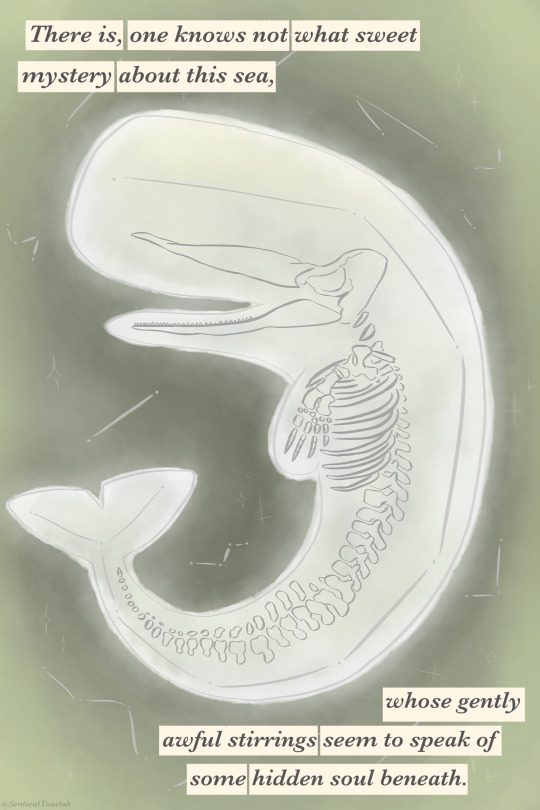

Trying out new art styles. Whale skeletons are very cool :) And of course it wouldn’t be complete without the usage of the colour green for no reason in particular (Spoilers: I think I like the colour green).
Thoughts on Moby Dick for today: A bit of the cetology chapters and a bit of Ishmael! Because… Whale.
We all know there’s copious amounts of whale anatomy lessons in Moby Dick, some of which are true and some are more outdated. This is usually the least favourite part of the book for many people, and understandably so. It can be annoying for those who only read for the story and probably even more annoying for people who are actually interested or knowledgeable on the modern topic of cetaceans (or marine biology in general I mean like Ishmael called a seal (or was it a walrus? I forgot) an amphibian I don’t think I have to elaborate).
But I’ve always thought the way Ishmael narrates the story, even though it’s through a book, is as if you were actually there sitting in front of him while he tells you the tale. Like listening to an actual sailor ramble about the ocean. Like a one-sided conversation, you could say. It just gives those vibes. That feeling of a naturally flowing conversation was actually what kept me really interested in the book because even though he barely talks about himself you can feel a kind of connection to Ishmael.
So if we were to treat it like him actually telling you all of this in one sitting on the spot I thought wouldn’t it make sense for him to want to avoid the worst parts of the story? So he drags it out before getting to the sad part. Or alternatively, the more logical explanation is the fact it’s a sailor telling a story about the sea to a land dweller so of course he would want to give them quick context notes. And especially considering the time this book was first published many people were unaware about even the basic facts of a whale.
Because among the many reasons Melville wrote Moby Dick was to educate people on the wonders of whales. And he succeeded! …Partially. He might not be the one we should give all of our credit to for the research of whales but at the very least he sparked a kind of curiosity in the common people back in the day. Sure it’s outdated but he tried his best and I think that’s very cool :) shout out to Herman Melville for that.
Oh oh wait! I just thought of something. We can also view it as Ishmael writing a personal diary instead of being an actual book to publish to many. That works well too, and gives him more reason to want to drag out the tale. He’s not just writing about their death and demise he’s writing about their lives to remember as well. A diary.
But on a different note, since I think that whole previous subject is already commonly thought about enough by Moby Dick readers;
Whale skeletons like I mentioned before are very cool too. But at the same time they kinda freak me out. Cause it looks like both a fish and a mammal at the same time. The skull especially reminds me of I think horses or other medium sized quadrupedal herbivores?? And the fingers are freaky too. The fingers are the freakiest. I’m sure if you showed them to someone who has never seen a whale skeleton they’d be very confused or scared. Maybe both.
But it really is curious to see the remnants of their land dwelling days through their bones!
#moby dick#DAILY DICK!!#whale weekly#art#fanart#Whale bones scare me#literature#discussion#and thoughts#herman melville
22 notes
·
View notes
Text
so im still persevering in charlotte brontë's shirley. yesterday i went to a poetry open mic & this guy read a really uncomfortable oversexual piece - it wasn't even a poem - but all i could think of was the part in shirley where she talks about being subjected to sir philip's bad poetry and her secondhand embarrassment... yeah, lots of good relatable social commentary and observations of everyday social experiences in this novel - i think charlotte reminds me of austen sometimes in those regards!
and in other news i'm also at the beginning of herman melville's moby dick. its much less boring than i thought it would be so far! some of the stuff with queequeg has been killing me - the descriptions of ishmael waking up with queequeg spooning him were like something out of a modern cartoon. and (not only because of that moment) i deeply wonder if the "head-seller" bit was supposed to be an innuendo for homosexuality/prostitution considering it was in the same chapter concerning ishmael's panic over having to share a bed with said "head-selller."
i'm so sad the ending for moby dick was spoiled for me but hopefully i'll be able to forget about that just like i somehow conveniently forgot about the main twist in jane eyre and subsequently managed to be more shocked by it than any other plot twist i've ever come across. the mind is a curious thing so we'll see
22 notes
·
View notes
Text
I think Herman Melville would go crazy town banana pants over the technology we have that makes looking at whales so easy. Half of Moby Richard is basically him trying to get his readers to just ✨get ✨what a whale looks like and I’m like bro I can watch them swim around on YouTube
377 notes
·
View notes
Text
You know, I find it to be truly fun to think about connections of various writers and wonder how those might play out in the story, however then I remember that Asagiri himself isn't particularly interested in doing this, aside from some exceptions. For better or for worse, which is a matter of preference, he truly creates an entirely new story with some references to the real people, despite using their names and alluding to their works. Usually I'm rather cool with that, "Let the man go wild, he's awesome! 🥰", however sometimes I can't help, but feel like it results in some missed opportunities for the story. If you name characters after real people, might as well play with the allusions to them a little more. Here are just some examples of the connections between the real writers, that I am aware of, yet they played no role in the BSD at all:
Akutagawa Ryunosuke was the student of Natsume Soseki and loved his teacher dearly - zero interactions between the two during the story
Q/Yumeno Kyusaku was quite a huge fan of Edogawa Ranpo and Edogawa later became the benefactor of the writer - zero interactions between the two during the story
Tayama Katai and Mori Ogai became acquaintances during the Russo-Japanese war and spent lots of time talking with one another while at it - zero interactions between the two during the story
Edogawa Ranpo was the first person to translate and introduce Lovecraft's writings in Japan - zero interactions between the two during the story
Akutagawa Ryunosuke loved Poe's works and translated them into Japanese - zero interactions between the two during the story
Nathaniel Hawthorne and Herman Melville were great friends and Melville adored Hawthorne so much, that it influenced the creation of "Moby-Dick" a lot and from what I have seen many people say he was actually in love (maybe the writer was indeed in love with him, but I am afraid, I'm not qualified enough to talk about this. Feel more than free to add info to the post) - zero interactions between the two during the story
H. P. Lovecraft was quite a fan of Edgar Allan Poe and his works were heavily influenced by him - zero interactions between the two during the story
Nikolai Gogol and Alexander Pushkin were great friends and influenced each other a lot - zero interactions between the two during the story
Fyodor Dostoevsky was one hell of a fanboy of Alexander Pushkin and even had the honor to give an official speech at the anniversary of the latter's death - zero interactions between the two during the story
And etc.
I mean, don't you guys think it would have been interesting to see Mori and Katai interact, given Katai's heavy dislike for the mafia? Hell, Mori might have even been made the main reason behind Katai's strong emotions! And then there's the situation with Akutagawa and Natsume. I find it to be truly surprising that Mori and Fukuzawa were made Natsume's students in the BSD, yet the person who was actually Natsume's student in real life hasn't even talked to him so far. Nathaniel and Melville are actually part of the same organization, yet there's nothing about it, though to be fair, the Guild members suffer from the lack of screentime in general. But just imagine if there was a tragic love story between the two instead of the one we got with Margaret arffufgbh. However, like I said in the beginning, it's a matter of preference. The story still works on its own and Asagiri still gives us from time to time such interesting references so in general I am very content and happy X3 I'm just saying here my thoughts on how fun it would have been, if he had gone even further
#ticklinglady talks#wow that's a lot of people to tag avghjkg#bsd#bsd akutagawa#bsd mori#bsd ranpo#bsd katai#bsd nathaniel#bsd fyodor#bsd nikolai#bsd q#bsd kyusaku#bsd poe#bsd natsume#bsd lovecraft#bsd meta#bungo stray dogs#bungou stray dogs
150 notes
·
View notes
Text
Relationships/Opinions!
"Lovecraft, what do you think of everyone around you?"
~
CANON CHARACTERS
John Steinbeck
"he's nice... i like his voice... it's nice to recharge energy around him. in short... i love him."
Lucy Maud Montgomery
"she's also nice... i like her café outfit thing."
Mark Twain
"i feel... kind of bad for... not spending time with him. he looks like he enjoys company. maybe not mine, though..."
Nathaniel Hawthorne
"i don't know what happened to him."
Margaret Mitchell
"she... kind of makes me anxious. i don't know why. i think she just takes this stance of superiority without knowing it."
Herman Melville
"he's very nice. i don't feel too nervous around him. he reminds me of the sea."
Edgar Allan Poe
"he has anxiety. like me. i can relate to him for that. i don't know how he... writes books for so long though."
Francis Scott Key Fitzgerald
"long name. he does a lot for his family. i respect that... i guess...? john doesn't like him so my feelings are mixed. also, his authority makes me itchy."
Louisa May Alcott
"she's also nice. i don't see her much."
Karl
"he's cute. i have this... odd urge to pet him."
Chuuya Nakahara
"i don't like him much. that's... that's it."
Osamu Dazai
"he's okay. i guess."
Q
"i'm still working on that balloon dog... dachshunddd..."
Tanizaki
"he kind of hates me. can't fix that much."
~
NON-CANON INTERACTIONS
Kenji/Tiny Kenji
"sons. i want... to take care of them. emotional support farmers. like steinbeck..."
Levi (pleasepress1forfrontdesk)
"i was the one who stole some snacks... from that broken vending machine... and he didn't rat me out to the police. anyways, levi is nice."
Mary Shelley (its-aliiive)
"she wants to study me. she speaks in fancy words."
Ross (pickupthephoneboy)
"i like him. i don't know if we're friends or not. i think yes. maybe."
Fukuzawa (fukuzawa-armeddaddyagency)
"i thought he would hold a grudge against me. surprisingly he was nice. he makes me feel itchy though... i think it's the authority aura he gives..."
Anthony (spider-man-with-a-gun)
"he's nice. i gave him coral and i think a pearl once."
18 notes
·
View notes
Text
Blaseball is dead.
here's an article I wrote about one wild incident of emergent narrative weirdness, an at-bat where a little frog refused to stop swinging at pitches and locked up the entire engine for a while.
oh and also the Herman Melville story Bartleby the Scrivener. it's about that too.
as Blaseball wraps up, and in the face of a few pretty disappointing years of collapsing fan-driven projects like it, I'm feeling a lot of the ambivalence that comes late in the piece:
Characters like Bartleby and Chorby appeal to me because they represent a disruption, a suggestion that things can be different than they are if we simply... well, not "stop playing by the rules", exactly. After all, nothing here was against the rules, it emerged from the rules themselves, and the force of Chorby's and PolkaDot's natures colliding together. No, this was malicious compliance, carrying out orders to the letter of the law, behaving like a silly little automaton, doing exactly what the boss says even when doing so would obviously result in disaster.
This kind of thing doesn't necessarily work out for the maliciously compliant. Sorry for the spoilers for a century-and-a-half-old story but Bartleby ultimately dies in poverty. The Magic did not win the game in which Chorby carried out her heroic string of foul balls.
I guess it's hard for me not to look at the postmodernists like Slavoj Zizek for whom Bartleby is an iconic figure, and look at the kind of "leaderless" and "demandless" movements driven by ambient refusal that they championed, and not feel like just refusal and random malicious compliance don't make for a particularly sustainable movement. by the same token, The Game Band seems to have really tried to operate their company differently, to opt out of some of the business practices that we all kind of hate the game industry for employing. a live service game that doesn't include a form of gambling with real money? a franchise that encourages fans to produce their own merch? wow! then later: ah, well, nevertheless.
it makes me think of a bit in Graber's Utopia of Rules where he describes the difficulties of an anarchist house collectively owning a car, and how they come not from anything as obvious as scheduling, but from figuring out how to define that collective ownership within a legal state framework that assumes one person's name will be on the insurance. it seems difficult to build a new world parasitically inside of, and from the matter, of the old.
RIV Blaseball.
74 notes
·
View notes
Note
Good evening dear! Your blog is absolutely amazing and it’s so interesting to read your posts ☺️💓 I wanted to kindly ask, if you will be interested of course, can you please make a post about zodiac signs and books from classic literature? It would be great 🥰💓 Thank you love!
I'm so glad that you find my posts interesting! Most definitely! You're very welcome!
Zodiac Signs As Classic Literature
Aries - "Moby Dick" by Herman Melville: A story of adventure, ambition, and the relentless pursuit of a goal, much like the determined nature of Aries.
Taurus - "Pride and Prejudice" by Jane Austen: A tale of enduring love and societal expectations, appealing to Taurus' appreciation for stability and romance.
Gemini - "The Strange Case of Dr. Jekyll and Mr. Hyde" by Robert Louis Stevenson: A narrative exploring the duality of human nature, akin to the curious and adaptable traits of Gemini.
Cancer - "To Kill a Mockingbird" by Harper Lee: A heartwarming and poignant novel that delves into themes of empathy, family, and justice, resonating with Cancer's nurturing and compassionate spirit.
Leo - "The Great Gatsby" by F. Scott Fitzgerald: A story of glamour, ambition, and the allure of the American Dream, capturing the dramatic essence and desire for recognition often associated with Leo.
Virgo - "Jane Eyre" by Charlotte Brontë: A tale of self-discovery, resilience, and the pursuit of independence, reflecting the practicality and inner strength of Virgo.
Libra - "Anna Karenina" by Leo Tolstoy: A narrative exploring complex relationships, love, and societal norms, echoing Libra's appreciation for balance, harmony, and interpersonal connections.
Scorpio - "Wuthering Heights" by Emily Brontë: A passionate and intense tale of love, revenge, and the darker aspects of human nature, resonating with Scorpio's depth and emotional intensity.
Sagittarius - "The Adventures of Huckleberry Finn" by Mark Twain: A story of freedom, adventure, and self-discovery, reflecting the adventurous and philosophical nature of Sagittarius.
Capricorn - "Great Expectations" by Charles Dickens: A narrative of ambition, self-improvement, and societal advancement, reflecting the perseverance and determination often associated with Capricorn.
Aquarius - "Brave New World" by Aldous Huxley: A thought-provoking novel that delves into futuristic societal norms and individuality, mirroring Aquarius' unconventional and forward-thinking perspective.
Pisces - "The Picture of Dorian Gray" by Oscar Wilde: A tale of beauty, art, and the complexities of the human soul, resonating with Pisces' imaginative and introspective nature.
46 notes
·
View notes
Note
you ever read journals from gay or bi whalers????
Not explicitly, but that’s so often the way of things regarding lgbtq+ history. Are the men whose journals I’ve read who occasionally describe their fellow whalers as fine/good-looking or handsome attracted to them, or simply using complimentary language? Does one man saying he played as another man’s “lady” at a dance during a gam mean anything regarding his identity in relation to other men, or was it simply the language he used to say he danced as the opposite partner in an all-male space? Who knows! Maybe, maybe not. Is a mate goading the men in his boat's crew by saying:
"I love you, my dear fellows, yes, yes, I do; I'll do anything for you, I'll give you my heart's blood to drink"
anything? Dunno! Sure is hot and weird tho!
Scholar Margaret Creighton highlighted one whaler, Elias Trotter, as someone who forged--if not romantic--very close emotional relationships with other men. This included both men he met briefly on gams as well as men aboard his ship.
He described one man, Charles Wheeler, on a gam saying that he ‘drew my attention on account of his manly beauty, activity, and intelligence’, and spent the entire gam speaking with him alone for hours, lamenting at the end the inevitable parting when both ships went on their way. He also developed a close relationship with someone on his ship named Longworth.
Dan W. Everton is a graduate student who spent time researching Trotter, and at a talk highlighted an excerpt of Trotter’s description of Longworth. I found it very poignant and it gives a little bit of insight to one man's perception of another, as well as the specificity of life at sea:
“During the night watches Longworth and myself will paint a pleasing future and will count and cipher out the many days to elapse before we tread our native soil. Will build many castles in the air and then with sober thought will crush them. How truly does sympathy entwine around the heart and produce friendship in its purest, fondest state. How such interchange of thought foments affection? I flatter myself tis even so with us, for, when after these interchanges of thought, of hope, of sympathy I know and feel that the friendship between us grows stronger and more lasting. At sea, there is no formality. Man acts himself and tis here that none has an opportunity of seeing his fellow in all his impurities as well as in all his goodness. I take pride in writing that, in every circumstance and in all duties, Longworth during the last twelve months has shown himself to be one of nature’s noblemen, so kind, so good, so free.”
Since Trotter’s journal hasn’t been digitized I haven’t been able to read it myself since I don't have physical access to the collection it lives in! I'm really hoping that it will be digitized (or fully transcribed) one day though.
The only (very scant) records I’ve seen explicitly regarding same sex activity on whaleships have been non-consensual instances in which there was disciplinary action taken. And that disciplinary action was also in connection with other violence/threats of violence from the man in question that led to his expulsion.
How consensual same sex relations on a whaleship may have been regarded and navigated is a bit of an unknown. But as with any same-sex occupation (especially something as lengthy and isolating as whaling, where one would maybe get liberty ashore every 6ish months) there were undoubtedly going to be same sex acts and partnerships. To say otherwise would be silly, I think. The absence of their mention gives me the sense that it was something people tended to look the other way with (or circumstantially accepted) if parties were consenting, rather than that they just didn’t happen at all. Herman Melville’s ‘oh I love you my fellows’ Moby Dick chapter that’s just an extended mutual masturbation pun has to come from somewhere. And not just from the notion that Melville likely loved men. But uhhh if you want a gay/bi whaler, there’s probably Melville, at the very least.
981 notes
·
View notes
Text
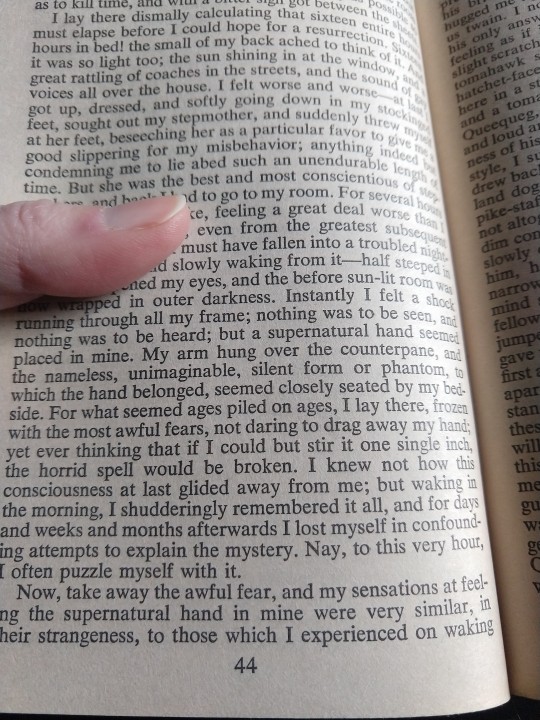
"At last I must have fallen into a troubled nightmare of a doze; and slowly waking from it--half steeped in dreams--I opened my eyes, and the before sun-lit room was now wrapped in outer darkness. Instantly I felt a shock running through all my frame; nothing was to be seen, and nothing was to be heard; but a supernatural hand seemed paced in mine. My arm hung over the counterpane, and the nameless, unimaginable silent form or phantom, to which the hand belonged, seemed closely seated by my bedside. For what seemed like ages piled upon ages, I lay there, frozen with the most awful fears, not daring to drag away my hand; yet ever thinking that if I could but stir it one single inch, the horrid spell would be broken. I knew not how this consciousness at last glided away from me; but waking in the morning, I shudderingly remembered it all, and for days and weeks and months afterwards I lost myself in confounding attempts to explain the mystery. Nay, to this very hour, I often puzzle myself with it."
--Herman Melville, Moby Dick
Throwback to that time Ismael woke up to discover he was holding hands with the monster under the bed, and it's never talked about again.
13 notes
·
View notes